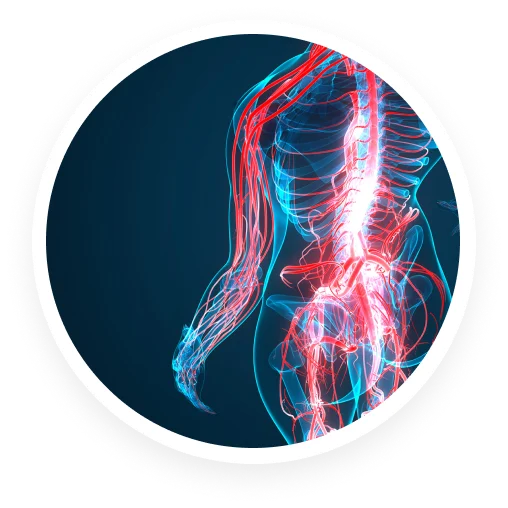
Peripheral Nerve Injuries
Peripheral nerve injury is something that one must not take lightly, as it brings pain and can affect having a normal life.
Allen Finney
Review
Young ladies behind the counter were nice and professional. Dr. Khan was and is awesome. You felt he really cared which I have not felt in the 2 years I've been injured. Only reason I did not give it 5 stars was the hard time I had finding it.
Allen Finney
Review
Young ladies behind the counter were nice and professional. Dr. Khan was and is awesome. You felt he really cared which I have not felt in the 2 years I've been injured. Only reason I did not give it 5 stars was the hard time I had finding it.
charles griffin
Review
Have been doing a wonderful job with help with my nerve pain, listen to me, and my request no to be put on pain killers but to help find the problem, always return calls so glad is was referred to them.
Stacey Mejia
Review
Awesome staff Dr. Kahn is a really good Doctor he listens and is a helping man!! I appreciate all of your guys work you do for your patients!! You even call to give reminder the day before your appointment! Again that's so awesome!!
Forrest Hammer
Review
NOTHING BUT THE BEST. ABLE TO WALK. ABLE TO PERFORM TASKS THAT I COULDN'T FOR A LONG TIME, LIKE DAILY WALKING, BENDING OVER, CARRYING GROCERIES AND ENJOYING A MOVIE AT THE CINEMA. THANK YOU DR. ASIM KAHN.
Jeanne Neathery
Review
Dr RYklin is amazing. He treats each patient as if you’re his only one. I’ve been seeing him for 7yrs due to a neck injury. He definitely finds what pain management meets your individual needs. The practitioners are amazing as well!!!!
Marty Klopper
Review
Pain Dr office. Staff is friendly and professional. Lots of paper work to be filled out. Office was clean and neat. Masks on Staff at all times and required for patients to enter. Will be going back for follow-up appointments.
Kim LindL
Review
The staff is very pleasant and Dr. Khan is very good with a needle I've been getting epidurals and shots in my foot and lower back for about 4 years now, he is very good and I would never go to another place
Angel Bussert
Review
The doctor actually listens. I have been a patient for years and love the staff and doctors. I've been to all the locations the country club one is always super busy queen creek location is never packed so I go there.
Guy Romero Jr
Review
Every Staff personnel are very professional, courteous and patient respectful in caring for each medical problem. We live out in Laveen, but finding good patient care are hard to find, Truly Blessed Guy E Romero
John Crosby
Review
They do a great job in today's challenging health care system. Great Nurse Practitioners who work hard. Great support staff. Doctors are expert practitioners. Stable practice. I have over five years personal experience with them.
Stacey Mejia
Review
Awesome staff Dr. Kahn is a really good Doctor he listens and is a helping man!! I appreciate all of your guys work you do for your patients!! You even call to give reminder the day before your appointment! Again that's so awesome!!
Kim LindL
Review
The staff is very pleasant and Dr. Khan is very good with a needle I've been getting epidurals and shots in my foot and lower back for about 4 years now, he is very good and I would never go to another place
Guy Romero Jr
Review
Every Staff personnel are very professional, courteous and patient respectful in caring for each medical problem. We live out in Laveen, but finding good patient care are hard to find, Truly Blessed Guy E Romero
Angel Bussert
Review
The doctor actually listens. I have been a patient for years and love the staff and doctors. I've been to all the locations the country club one is always super busy queen creek location is never packed so I go there.
Forrest Hammer
Review
NOTHING BUT THE BEST. ABLE TO WALK. ABLE TO PERFORM TASKS THAT I COULDN'T FOR A LONG TIME, LIKE DAILY WALKING, BENDING OVER, CARRYING GROCERIES AND ENJOYING A MOVIE AT THE CINEMA. THANK YOU DR. ASIM KAHN.
Jeanne Neathery
Review
Dr RYklin is amazing. He treats each patient as if you’re his only one. I’ve been seeing him for 7yrs due to a neck injury. He definitely finds what pain management meets your individual needs. The practitioners are amazing as well!!!!
Marty Klopper
Review
Pain Dr office. Staff is friendly and professional. Lots of paper work to be filled out. Office was clean and neat. Masks on Staff at all times and required for patients to enter. Will be going back for follow-up appointments.
John Crosby
Review
They do a great job in today's challenging health care system. Great Nurse Practitioners who work hard. Great support staff. Doctors are expert practitioners. Stable practice. I have over five years personal experience with them.
Carol Gravatt Davidson
Review
Absolutely the best place I have been too...so many doctors and always just prescribed pain pills for over 10 years. There is hope, after starting injections I feel so much better. I know I'm in the right place.
Tim Tuzon
Review
Been with Kahn for over a year and wouldn't want to be anywhere else. He is not a pharmacy! He solves the issues instead of hiding them with tons of drugs. Have had multiple procedures to correct the problems.
Brooke Keifer
Review
I was nervous when I brought my mom into the office. They are clearly a very busy office, but the front staff was kind, and the doctor was very confident in a treatment plan. Overall my Mom was very pleased with her visit.
Kari Lynn Plo
Review
I love Dr Ryklin and his assistant Liza! They've always been super good to me and very sympathetic to all my needs! They've done everything they can to make me comfortable and to help me with my pain! I'd refer anyone to them!
Lacey Smithson
Review
This office keeps getting better every time I go. Staff is friendly, doctors are very well educated and good at what they do. And they have helped decrease my mom's back pain by 80%! Everyone with pain should go to this place!
Katty Miller
Review
Dr. Khan is truly carrying, understanding and the VERY BEST AT ADMINISTRATING SGB INJECTIONS!!! I look forward to driving from California to be seen by him. I just can't say enough. Thank you Dr. Khan.
Britt Montoya
Review
Great place. Dr Khan is an awesome Dr and goes above and beyond to help you. Meghan is a wonderful P.A. as well. It says so much to have a Dr that truly cares about your outcome of your procedures. This is a goodhearted Dr
Julie Kierzek (Julz)
Review
Love them all. Dr Ryklin is so helpful and understanding. He takes helping people seriously & I'm extremely grateful for everything he & the PA's & MA's have done for me. Dr Ryklin has gone above & beyond for me.
Delicia N
Review
The team here are genuinely the most helpful providers I have ever had. I went through my worst lupus flare ever last year and mentally did not think I would make it. They truly saved me and made me feel like I could ask for help!
Caroline Copeland
Review
We are Dr. Ryklin's patients. He is an amazing pain management physician. All of the treatments that we receive work extraordinarily well. His entire staff, from front to back, are exceptional. Patient care is really the specialty here.
Eva Linda Hemmerling
Review
I'm a patient Dr. Khan/ NP Liza. I find Doc Liza caring always interested in me as a whole. Body/Mind/soul. Find comfort in her. Staff Dustin,Amanda are tops also. I highly recommend AZ Spine Institute. E.L.H.
Charles Eberhardt
Review
I have been to the Vineyard location 12 times and this is the best Doctor's office I have ever been to. The staff is by far the friendliest and most caring staff around. I actually look forward to my visits. Thanks for everything.
Becky Kirby
Review
For the last 12 years, Arizona pain and spine in Queen Creek with Lisa, has taken care of my pain issues. Without her, I wouldn't be able to manage the excruciating pain I have had after my time in the service

What are peripheral nerve injuries?
Peripheral nerves branch outward from the central nervous system and relay important information from all areas of the body back to the brain. Peripheral nerves are not protected by the cranium or spinal column and are more susceptible to toxins, making them vulnerable to injury or disease.
Nerve injuries caused by malfunction or disease are referred to as neuropathy. Neuropathy can affect several kinds of nerves and cause pain or discomfort in many locations in the body. Peripheral neuropathy encompasses nerve damage or disease impacting any nerves that are not the brain or spinal cord.
What are the symptoms of peripheral nerve injuries?
Nerves are fragile and can get damaged due to an accident, an injury, or as a result of another condition. The most common sign of nerve damage is pain, which can be burning, jabbing, sharp, freezing, or throbbing. Other signs and symptoms include:
- Lack of coordination
- Muscle weakness
- Extreme sensitivity to touch
- Prickling or tingling sensation in the feet and hands
- Gradual onset of numbness
What causes peripheral nerve injuries?
There are various causes of peripheral nerve injury. Basically, the nerve gets injured due to stretching or pressing of the nerve. This may be caused by toxins, infection, illness, or trauma. Other known causes also include cancer, diabetes, vitamin deficiency, Lyme disease, and even alcoholism.
How are peripheral nerve injuries treated?
Part of the treatment is conducting the necessary examinations and diagnostics. The doctor will first review the patient’s medical history and ask about symptoms and any previous surgeries or accidents. Initial neurological and physical examinations will then be conducted. After this, depending on the result of the initial examinations, the doctor will require any of these diagnostic tests: electromyography (EMG), nerve conduction study or magnetic resonance imaging (MRI).
In some cases, surgery and other treatments may not be necessary because peripheral nerves can heal on their own. The best way to heal in this case is to rest and take medications for pain and other symptoms. But to restore function and prevent stiffness, physical therapy is necessary. However, if the peripheral nerve injury does not heal properly, surgery may be required.
AZ Pain and Spine Institute
Peripheral Nerve Injuries Treatments
Here at Arizona Pain and Spine Institute, we improve our patients’ quality of life by alleviating and managing their pain. Some of our Peripheral Nerve Injuries treatments include:

Why choose AZ Pain and Spine Institute to treat your Peripheral Nerve Injuries?
We have a team of medical practitioners, pain management doctors, and staff who are experts on pain management, including Peripheral Nerve Injuries. We use state-of-the-art technology and effective approaches in achieving our mission. We care about your well-being and are committed to making your life pain-free.
